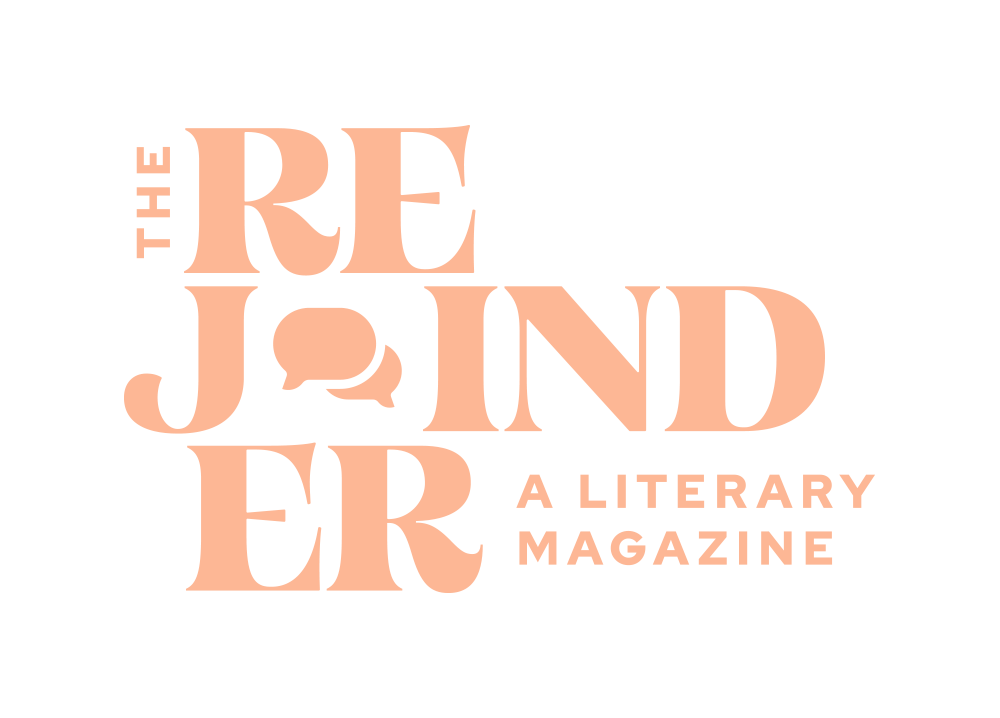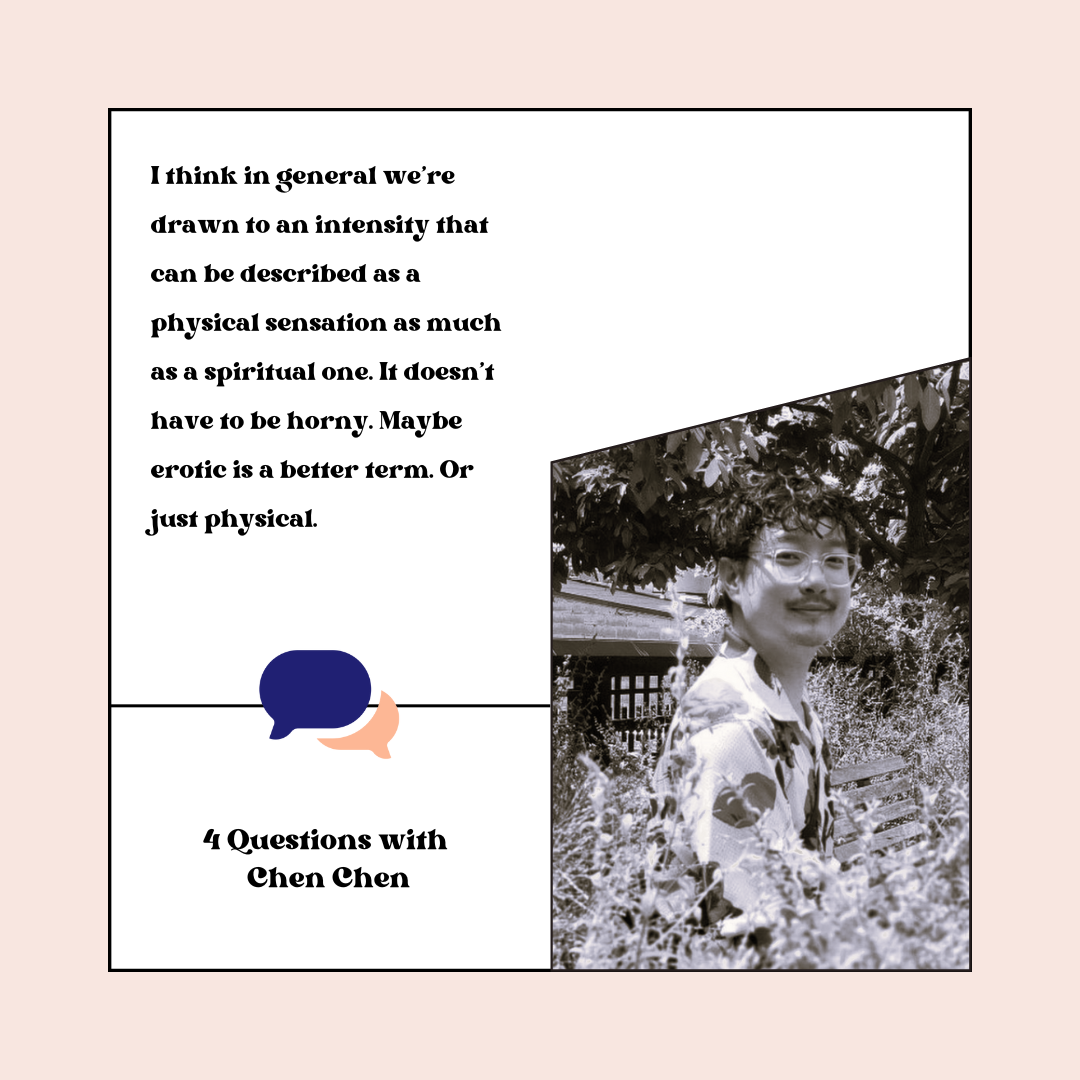4 Questions with Chen Chen
photo credit: Anna Jekel
Today we published two poems by Chen Chen: “Queer Nightlife” and “Quintessence: For Recreational Purposes.” Michael Colbert spoke with Chen about erotic poetry, writing in series, and harnessing joy.
The Rejoinder: I love the way the speaker brings together aural and physical pleasure in "Queer Nightlife." The speaker says he needs "to get high/on the sound of words." How are you interested in using poetry and the pleasure of language to explore these more sensual desires?
Chen Chen: Thank you for your kind words about the poem. I mean, you’re publishing it, so that must mean you enjoy it, right? So, this question makes think me about how some of my early poetry mentors said a poem must “give pleasure,” which intuitively I agree with, given my own pleasurable experiences reading poetry, and yet there's also a part of me that finds it odd or not quite accurate, since poems tend to be a challenging genre. They don't usually give the same kind of pleasure as, say, a bowl of ice cream. But maybe because there’s something challenging or strange or mysterious, the pleasure in poetry is the more memorable kind, the kind that haunts you or that you want to carry around inside.
That said, I also have some memorable experiences with ice cream. That wasn’t meant to sound lewd. Though yes, poets are horny creatures. Not every single poet out there, but I think in general we’re drawn to an intensity that can be described as a physical sensation as much as a spiritual one. It doesn’t have to be horny. Maybe erotic is a better term. Or just physical. I think there’s an inherently physical quality to a poem. It’s an embodiment of a thought, an emotion, an urge, an urgency. I want a poem to be moving in the sense that it moves not only your heart or mind but also your belly, your left elbow, your big toe, and perhaps your loins. Ugh, what a silly word. Loins. The sound of it, though… I’m drawn to words that other poets might cringe over. That’s one of the challenges that gives me great pleasure when I work on a poem: how to transform the cringy words into—I don’t know what. Eventually, my body tells me: yes, that feels good.
TR: "Quintessence: For Recreational Purposes" is part of a series. When you work on a series, how are you thinking about form and ideas across poems? What possibilities arise through a series?
CC: I used to not write in series at all because I’d get bored by the third poem. I wrote a lot of companion poems, though—just pairs. That was as much energy/interest as I could sustain, I guess. And I suppose I still think of the poems in a series as companions—there are just more of them now. One organically leads to the next in an associative way. I don’t plan out how many to write or in what order. I do give myself some very basic parameters, as I want the poems to have a shared identity in terms of form and theme. But I keep those parameters pretty loosey-goosey, as I always want room to play, to throw a wrench into my own machine.
Anyway, I’m calling this particular series the Quintessences and it’s central to my next book of poems, the title of which is Quintessential Earthly Activities. Each quintessence poem is written in quintets (because quintessence literally means “fifth element”) and each has an indentation pattern that I can never remember how to do without looking at the last poem in the series I wrote. And the poems are united by a quasi-philosophical, meditative, but also sensuous and sensual examination of everyday life. I’m thinking about how the term quintessence comes from medieval philosophy and alchemy (the fifth and “highest” or “purest” element), and how it's used in a different way in modern physics, too. I’m thinking about myself as a body, a queer Asian hottie-thinker (like, the opposite of a himbo? I wish I could be a himbo, but such is not my fate) on this earth, which is also a body, maybe also a queer Asian non-himbo-who-enjoys-overthinking-yet-desires-muchly-to-get-sweaty-too. Hope that helps.
TR: These poems are bounding with joy, and I feel this in a lot of your work. Where do you find pleasure in harnessing joy in your poetry? Do you encounter any challenges in doing so?
CC: I’m such a grouch in my day to day life that I find it funny when I’m asked about all the joy in my writing, but it’s true, it’s there. I just don’t typically start from a joyful place. It takes a lot of effort to move in that direction, but I’m interested in the movement and I’m interested in the effort. Someone posted on Twitter recently in response to the whole AI art discourse that making art should be difficult—it’s a spiritual practice, not a get rich quick scheme. It’s slow. I don’t think it needs to be, like, torment. The tortured artist thing—no, I don’t want that for anyone. But making the work, it takes tremendous effort and dedication and willingness to fail, which is ultimately a willingness to grow.
For me, the joy, when it’s real joy and not some delusion, is always a surprise. And the surprise—in a turn of phrase, a shift in tone, a development in the poem’s subject—is a crucial component of the joy. I write to be surprised. No, I write to be changed. I want to be different after I write a poem. And I think I often want to be in a more joyful or maybe hopeful place. And that’s a hard place for me to get to, actually. I’m much inclined toward melancholy. Ennui comes easy. My perpetual baseline wish is to give up. I wanted to give up halfway through this interview. But then language, the sound of words, working on poems, thinking and talking about poems—these bring wild joy, transformative pleasure.
TR: What's exciting to you in poetry right now, either in your reading or writing?
CC: I’m excited by the work that so many of my fellow poets are making. I’ll just mention a few: Allison Titus’s new book, High Lonesome, is absolutely gorgeous. Sarah Levine, a writer I’ve known since college, has come out with an incredible debut full-length, Each Knuckle with Sugar. And I keep revisiting Bhanu Kapil’s most recent book, How to Wash a Heart—this should be required reading everywhere, but requirements are boring, so think of it as… highly desirable reading. I really want you to want to read it! Please do and then tell me your thoughts. Or better yet, keep them to yourself, a most delicious secret.

